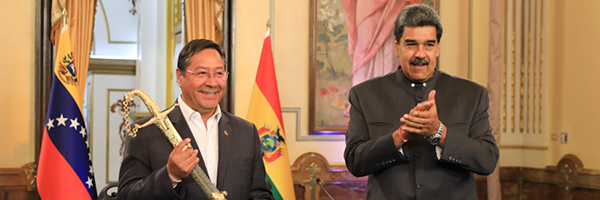Nicolas Maduro, Has He Become A Neoliberal?
In various sectors of the Venezuelan opposition, in the mainstream media or in the usual middle-class “political science trotskyist” circles, a new chant is circulating. The slow exit from the Western blockade is due to the fact that Nicolas Maduro has finally “embraced capitalism” or “taken a neoliberal turn”. For Alberto Barrera Tyszka of the New York Times (1), neoliberalism is even the economic arm of Maduro’s “dictatorship”.
The “evidence” varies: from images of posh neighborhoods in Caracas with ostentatious stores, restaurants and luxury casinos, to job offers on digital platforms and the circulation of dollars in the economy. For the “Communist Party of Venezuela” (now in opposition and allied here and there with the right), “the low wages, the reduction of public spending and the so-called privatization attempts framed in the anti-blockade law are expressions of this neoliberalism that confirm Maduro’s distance from Chavismo.”
For an economic policy to be neoliberal, certain conditions must be met. One of them is the deregulation of all possible economic activity. That is, the elimination of all factors of state control, supervision, social protection or management over strategic, financial and essential public services. The result is inequality, social despair and repression, with only the richest still able to afford quality health care, education, housing and food. As a recent example of neoliberal shock therapy, we have the government of Mauricio Macri in Argentina (2015-2019) or of course the “Chilean miracle” of the Pinochet era. Politically, the “neoliberal laboratory” that Macri led in Argentina involved the rise of bankers and technocrats to high positions of power, shaping a corporate government dotted with CEOs. Linked to these neoliberal “adjustments” was his administration’s extraordinary debt to the International Monetary Fund (IMF) and private creditors (vulture funds), totaling more than $250 billion.
However, according to Venezuelan analyst William Serafino (2), if Maduro were a neoliberal, not only the state-owned company Petróleos de Venezuela, SA (PDVSA), but also the many state-owned enterprises such as the Caracas subway, electricity, telecommunications and water supply companies, to name a few, would already be in private hands. The current policies against corruption in the strategic spheres of the economy, the slow recovery of the productive apparatus – which is leading to better financing of the state through taxes on large companies, the reconstruction of public services deteriorated under the blockade, the transfer of non-US technology to circumvent the blockade, policies reinforced by the rebound in the price of oil and multipolar alliances, show the absurdity of the claim.
Just as the recent handing over by the Maduro government of 4,500,000 public houses to the popular sectors, the 13 million hectares handed over to small and medium-sized farmers as part of the agrarian reform (a program initiated by Hugo Chávez), the transfer of state powers, and economic and technical aid, to the popular self-governments (municipalities, communal councils, etc.), the maintenance of the state budget, and the creation of a new government, the maintenance of free higher education, the reconstruction of free public health care, and the massive anti-blockade food program carried out by the Local Supply and Production Committees (CLAP). The price of subsidized food, distributed monthly to the population, 95% of which is produced in Venezuela, is flattened: it costs the citizen only 5% of the market price.
In reality, the economic policies of the Bolivarian government are taking place in a context of ruthless economic warfare, which has led to a 99% reduction in foreign exchange earnings for the state, a drop in oil production, a closure to foreign trade, a weakening of the currency and capital flight. Then came hyperinflation, scarcity of goods and services, closure of industries, lower wages, deterioration of the quality of life and well-being of Venezuelans and finally the exodus of tens of thousands of Venezuelans. An unprecedented economic and social devastation on the part of the United States to which, explains Nicolas Maduro, “we must respond with flexible strategic action, defense and counterattack, to prevent the blockade from continuing to harm our homeland (…) we must respond with boldness and creativity, adapting, relaxing our legal and administrative framework, adapting to the permanent threat of sanctions, to complex and changing circumstances.” Joe Biden recently renewed Obama’s executive order making Venezuela “an extraordinary and unusual threat to the security of the United States” (sic), reiterated that he would not relax the blockade in any way, and even added an additional sanction to the existing 768. If Nicolas Maduro had become a neoliberal, how can it be understood that the imperial harassment continues against him?
The main characteristic of the Maduro government’s policy in the face of such economic warfare is that it has, on the contrary, resisted and rejected the formulas of privatization and abandonment of the population. As a sign of the times, many Venezuelan families are choosing to return to Venezuela, fleeing the social effects of neo-liberalism (the real thing), which is becoming more and more overwhelming in Europe or in other countries of the continent (Argentina, Chile, Peru, etc.). The Bolivarian government is the only one to have set up free flights for these citizens, on board its public company Conviasa (3). But the Bloomberg agency has found the real reason: “If the migrants go home, it is because Maduro has become a capitalist.”

 Thierry Deronne,
Thierry Deronne,